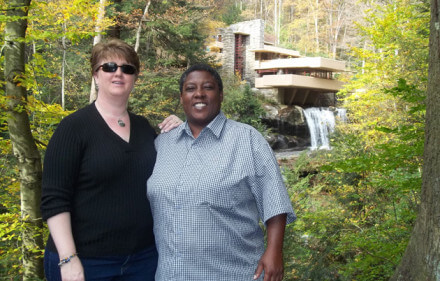A federal district judge in Los Angeles has certified a nationwide class action lawsuit attacking the constitutionality of the Defense of Marriage Act’s Section 3 in the context of the immigration rights of same-sex spouses.
Section 3, currently under review by the US Supreme Court in Edie Windsor’s challenge to DOMA, bars the federal government from recognizing legal same-sex marriages.
On April 19, Judge Consuelo B. Marshall first denied a motion to dismiss the case from the Justice Department and the Bipartisan Legal Advisory Group of the House of Representatives (BLAG), controlled by the GOP House leadership. She then ruled that plaintiff Jane DeLeon and the Center for Human Rights and Constitutional Law may sue on behalf of “all members of lawful same-sex marriages who have been denied or will be denied lawful status or related benefits” under federal immigration law “solely” due to DOMA.
Los Angeles district judge acts in case brought by immigrant same-sex spouse
US law extends special status regarding residency and citizenship application to foreign nationals lawfully married to US citizens, but the Department of Homeland Security (DHS) cites DOMA in refusing to allow legal same-sex immigrant spouses that protection. The Supreme Court’s ruling in the Windsor case is expected by June, and a Fifth Amendment victory there could resolve DeLeon’s challenge. A narrower finding for Windsor, though less likely, could mean that DOMA returns to the high court as an immigration case.
DeLeon, a citizen of the Philippines, came to the US on a visitor visa late in 1989 and stayed. Three years later, she met Irma Rodriguez and in August 2008, as residents of California, they married. For a variety of reasons, efforts DeLeon made to obtain legal status in the US prior to her marriage — based first on an application from her employer and later as the daughter of an elderly father who is a US citizen and would face hardship if she were forced to leave — were denied.
In 2011, she filed a new application, citing Rodriguez as the person who would suffer hardship in her absence. DHS denied that application as well, citing DOMA.
DeLeon’s lawsuit claims a violation of her Fifth Amendment rights, citing both equal protection and due process of law, and also asserts she is the victim of sex discrimination. Marshall ruled that both her wife and a son she had from a relationship with a man in the Philippines lacked “standing” to join the suit as co-plaintiffs, but found that DeLeon’s complaint stated a claim for an equal protection violation.
Relying on precedents of the Ninth Circuit where the Los Angeles district court is located, Marshall found that DOMA will be subject in DeLeon’s suit to a rational basis standard, under which the law is considered presumptively constitutional unless those challenging it can show it is motivated by nothing other than impermissible animus toward gays and lesbians. Representing DHS, the Justice Department raised technical defenses that succeeded in the removal of DeLeon’s co-plaintiffs and the narrowing of her claims. BLAG, in contrast, made much the same sweeping defense of DOMA that it mounted in the Windsor case, with arguments about traditional marriage and its advantages for rearing children that the Obama administration no longer credits.
Marshall observed that the Ninth Circuit Court of Appeals, in the Proposition 8 case, among others, had already rejected most of BLAG’s arguments. Since the Ninth Circuit has not yet weighed in on DOMA, however, one of BLAG’s arguments has not yet been considered there — that the federal government has an administrative interest in a uniform national definition of marriage and for that can rely on the practice in an overwhelming majority of the states.
Marshall rejected that last argument as well, since DOMA “does not ‘ensure that similarly situated couples will be eligible for the same federal marital status regardless of the state in which they live.’” Legally married same-sex and opposite-sex couples are “similarly situated,” but only opposite-sex marriages are recognized by the federal government.
“The Court further finds that Plaintiffs have stated a claim that DOMA Section 3 violates their equal protection rights,” Marshall wrote.
At the same time, Marshall rejected DeLeon’s due process claim, since DOMA does not involve the imposition of any criminal or civil penalties on DeLeon “based on her homosexuality.”
The court’s decision to certify this case as a nationwide class action is particularly significant, rejecting the government’s contention that ultimately every immigration petition turns on its own individual facts. Since DOMA is the threshold issue prior to any ruling in individual cases, Marshall concluded it was appropriate for it to be decided in one proceeding — and that DeLeon and her attorneys were qualified to represent the interests of a broadly-defined national class of plaintiffs — even though some in that class might be disqualified from staying in the US, working here, or becoming a citizen for other reasons.
In yet a third ruling, Marshall rejected DeLeon’s motion for preliminary injunctive relief — barring DHS from relying on DOMA — pending trial. Even though the court found several of the factors required for granting such relief were present — including the likelihood of DeLeon prevailing on the merits — Marshall concluded she would not suffer “irreparable injury.” She accepted the Obama administration’s argument that DHS is not actively seeking to remove same-sex spouses of US citizens while waiting for a ruling in the Windsor case. The government submitted a DHS memorandum related to existing practices regarding “prosecutorial discretion” in deportation cases, including an amendment issued last October specifically dealing with same-sex family relationships.
DeLeon’s attorneys at the Center for Human Rights and Constitutional Law are Peter A. Schey and Carlos R. Holguin.

































